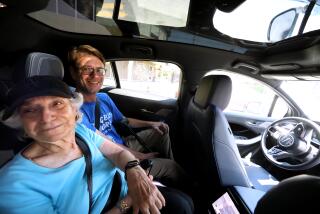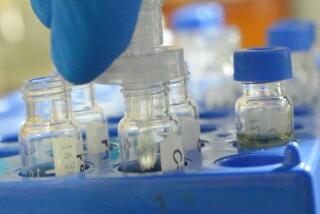Will Booze Testers Let You Breathe Easier?
- Share via
Afraid you may drink too much at this year’s holiday office party or family gathering and get stopped on suspicion of driving under the influence?
For drinkers who fear they may imbibe to the point their driving becomes impaired, relatively new self-test gadgets allow users to gauge their blood-alcohol level.
The products are sold at college bookstores, convenience stores and specialty retailers such as Sharper Image, as well as over the Internet.
How reliable are they? That depends on the product, how it is being used, who is using it--and which experts you talk to.
There is even debate over the wisdom in using a commercial product, whether a $1.39 kit that tests the user’s saliva or a $100 personal breath analyzer, to decide something as important as one’s fitness to drive after drinking.
The California Highway Patrol does not recommend personal alcohol-testing devices, said Anne DaVigo, a spokeswoman in Sacramento.
“We would strongly discourage people from using them as a test to determine whether they can drive or not,” she said. “We emphasize that motorists should abstain entirely from drinking to avoid any possibility they might be impaired when on the road.”
The National Highway Traffic Safety Administration agrees.
“We certainly wouldn’t endorse any device that would encourage people to skirt the law on driving while intoxicated,” said Tim Hurd, a spokesman at the agency’s Washington headquarters.
Criminal defense lawyer Lawrence Taylor, whose Southern California firm handles only drunk-driving cases, notes that personal tests cannot be used as evidence in court.
Taylor, who has written textbooks on DUI law, said some products “are so primitive and so unreliable, I would not base any decisions as to whether or not I wanted to drive.” Nor would he recommend that clients use them, he said, noting that the testing products “could give someone a false sense of confidence.”
“Measuring the amount of alcohol in the blood that’s going to the brain, based on what the person is breathing out through their lungs,” he said, is quite complex. “Try to do that with some little $10 gizmo and it’s a joke.”
On the other hand, one of the strongest supporters of personal alcohol testing is John V. Moulden, president of the National Commission Against Drunk Driving in Washington. He views alcohol-testing products as important self-education devices that could help people make more responsible decisions.
“I support them because, frankly, ignorance is no solution for preventing drunk driving,” said Moulden, whose government career included several years at the National Highway Traffic Safety Administration and the National Transportation Board.
*
Your Wheels decided to try two popular testers on the market: Guardian Angel’s Personal Alcohol Test and Sharper Image’s Digital Alcohol Breath Tester. In assessing them, we also wanted to compare their results with those from alcohol-testing technology used by law enforcement. The Los Alamitos Police Department agreed to help.
The Guardian Angel product, a saliva test, is one of the cheapest and most easily accessible such kits on the market. It consists of two test strips designed to determine your approximate blood-alcohol content.
The user simply places a strip on his or her tongue for 10 seconds, waits two minutes, then matches the strip against a color-coded chart indicating “lower,” “higher” or “highest” risk of a DUI arrest or crash.
The product, from Guardian Angel Holdings Inc. of San Francisco, comes in a wallet-size packet and sells for $1.39 at 7-Eleven stores, filling stations and 400 Barnes & Noble college bookstores, including the campus store at Cal State L.A.
Even though many college students are not legally old enough to drink, campus bookstores across the country sell the testers because alcohol abuse has become such a big concern, said Hattie Hamlin, a Guardian Angel spokeswoman.
Sharper Image’s Digital Alcohol Breath Tester sells for $99.95. The user blows into a tube connected to the hand-held device, generating a blood-alcohol content reading on an LCD screen to the nearest .001%. If the reading is .05% or higher--indicating a reading dangerously close to the .08 legal limit--a warning light appears and the device beeps.
After drinking two 6-ounce glasses of white wine during a 11/2-hour period, I tested the products at the Los Alamitos Police Department.
The Guardian Angel saliva test indicated that my risk was “lower” and my blood-alcohol content less than .04%. The Shaper Image device registered .025%.
Using the department’s breath-test equipment, police Capt. Todd Mattern and Det. Brent Westwood determined that my blood-alcohol level was .03%.
It was surprising how low my alcohol level registered in all three tests, for I certainly felt impaired by the alcohol. There’s no way I would have felt safe driving.
“Many people don’t realize that their blood-alcohol level can be way below the .08 limit, yet they can still be too impaired to drive,” Mattern said.
Said Moulden of the National Commission Against Drunk Driving: “Research shows that you have to pack away a lot of alcohol in a fairly short period of time to get near that threshold. It’s an eye-opener. It’s an absolute fallacy that anyone below a .05 should be presumed not to be impaired.”
That’s why he believes self-testing tools, if they are accurate and are used properly, can be valuable in educating the public, he said.
Though my test results varied, they were fairly close.
Initially, the Guardian Angel packaging claimed a 99.9% accuracy rate. But the company recently revised the packaging and removed that claim, spokeswoman Hamlin said.
Although the company stands by the accuracy of the tests, it wants consumers to understand that the results cannot be used as evidence in court and that blood-alcohol levels can be influenced by many factors, including certain medications, a person’s weight and age or the time elapsed since he or she last ate.
That said, two Northern California police departments have been so impressed with the testers they have distributed Guardian Angel packets during community outreach programs, Hamlin said.
The bottom line? If you are inclined to use these testers, do so with caution. Don’t let blood-alcohol level alone determine whether you will drive.
Even the warning on the Sharper Image product states: “Do not use the test results of this alcohol breath tester to determine whether or not to operate motor vehicles or machinery.”
*
Jeanne Wright cannot answer mail personally but responds in this column to automotive questions of general interest. Write to Your Wheels, Business Section, Los Angeles Times, 202 W. 1st St., Los Angeles, CA 90012. E-mail: [email protected].
More to Read
Sign up for Essential California
The most important California stories and recommendations in your inbox every morning.
You may occasionally receive promotional content from the Los Angeles Times.










